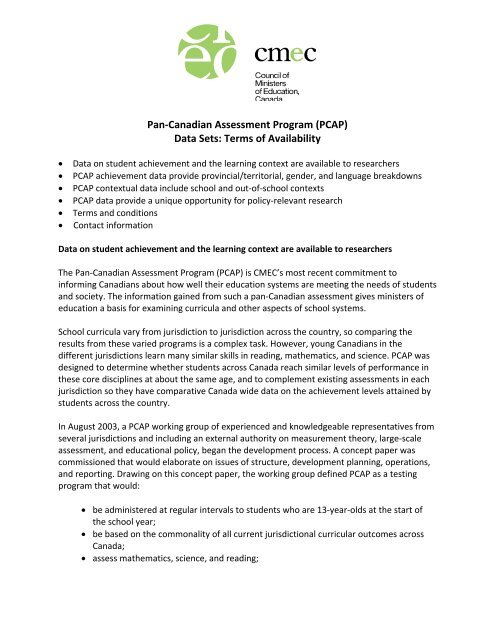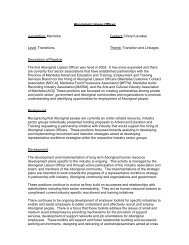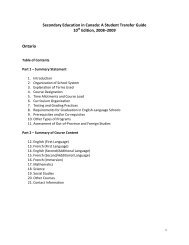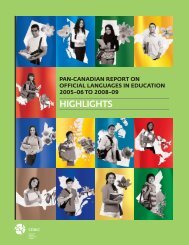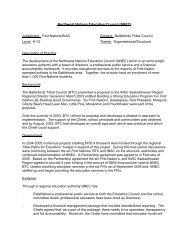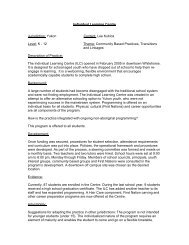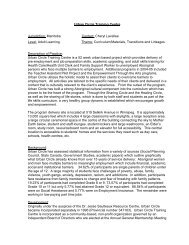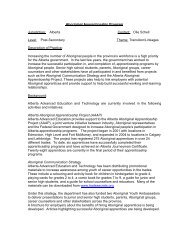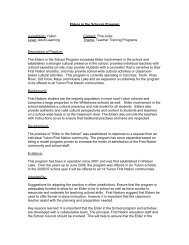(PCAP) Data Sets: Terms of Availability
(PCAP) Data Sets: Terms of Availability
(PCAP) Data Sets: Terms of Availability
Create successful ePaper yourself
Turn your PDF publications into a flip-book with our unique Google optimized e-Paper software.
Pan‐Canadian Assessment Program (<strong>PCAP</strong>)<strong>Data</strong> <strong>Sets</strong>: <strong>Terms</strong> <strong>of</strong> <strong>Availability</strong><strong>Data</strong> on student achievement and the learning context are available to researchers<strong>PCAP</strong> achievement data provide provincial/territorial, gender, and language breakdowns<strong>PCAP</strong> contextual data include school and out‐<strong>of</strong>‐school contexts<strong>PCAP</strong> data provide a unique opportunity for policy‐relevant research<strong>Terms</strong> and conditionsContact information<strong>Data</strong> on student achievement and the learning context are available to researchersThe Pan‐Canadian Assessment Program (<strong>PCAP</strong>) is CMEC’s most recent commitment toinforming Canadians about how well their education systems are meeting the needs <strong>of</strong> studentsand society. The information gained from such a pan‐Canadian assessment gives ministers <strong>of</strong>education a basis for examining curricula and other aspects <strong>of</strong> school systems.School curricula vary from jurisdiction to jurisdiction across the country, so comparing theresults from these varied programs is a complex task. However, young Canadians in thedifferent jurisdictions learn many similar skills in reading, mathematics, and science. <strong>PCAP</strong> wasdesigned to determine whether students across Canada reach similar levels <strong>of</strong> performance inthese core disciplines at about the same age, and to complement existing assessments in eachjurisdiction so they have comparative Canada wide data on the achievement levels attained bystudents across the country.In August 2003, a <strong>PCAP</strong> working group <strong>of</strong> experienced and knowledgeable representatives fromseveral jurisdictions and including an external authority on measurement theory, large‐scaleassessment, and educational policy, began the development process. A concept paper wascommissioned that would elaborate on issues <strong>of</strong> structure, development planning, operations,and reporting. Drawing on this concept paper, the working group defined <strong>PCAP</strong> as a testingprogram that would: be administered at regular intervals to students who are 13‐year‐olds at the start <strong>of</strong>the school year; be based on the commonality <strong>of</strong> all current jurisdictional curricular outcomes acrossCanada; assess mathematics, science, and reading;
<strong>PCAP</strong> contextual data include school and out‐<strong>of</strong>‐school contextsThe introduction <strong>of</strong> the contextual questionnaires allowed for research into the linkagesbetween the school, home, and social environment and student performance. The ultimategoal <strong>of</strong> the contextual questionnaires was to link the responses to the three questionnaires(student, teacher, and school) with the students’ results, in order to examine, in detail, howcontextual factors are related to achievement.<strong>PCAP</strong> data provide a unique opportunity for policy‐relevant research<strong>PCAP</strong>, a pan‐Canadian assessment with well‐structured contextual questionnaires, affordedunique opportunities for providing information related to key policy areas <strong>of</strong> concern toministries and departments <strong>of</strong> education. <strong>PCAP</strong> gave jurisdictions a simple way to comparetheir performance with that <strong>of</strong> the rest <strong>of</strong> Canada. <strong>PCAP</strong> data also provided information tojurisdictions about the performance <strong>of</strong> their own education systems.CMEC is committed to encouraging policy‐relevant research and maintaining, as a priority, thedissemination <strong>of</strong> research results to policy‐makers and practitioners. Researchers requestingaccess to the <strong>PCAP</strong> data sets will be asked to provide a signature <strong>of</strong> agreement to the terms <strong>of</strong>availability described below.<strong>Terms</strong> and conditionsCMEC will maintain a registry <strong>of</strong> all requests for the use <strong>of</strong> <strong>PCAP</strong> data so that jurisdictions canbe up to date about the research being undertaken using this data. Requests from researchersoutside the field <strong>of</strong> education who are interested in using <strong>PCAP</strong> data are welcome.For the purposes <strong>of</strong> the registry, researchers wishing to use <strong>PCAP</strong> data should include thefollowing information when requesting access to databases: Name(s) and affiliation(s) <strong>of</strong> researchers working on the project (i.e., name <strong>of</strong>university, college, ministry/department <strong>of</strong> education, school district/board, researchfoundation, organization, etc. where the researcher is employed or for whom theresearcher is undertaking the work) Contact information for the lead researcher on the project (mailing address, phonenumber, fax number, e‐mail address) A succinct description <strong>of</strong> the project, including:o the purpose(s) <strong>of</strong> the projecto the proposed methodology to be used for the research3
o the proposed sources <strong>of</strong> information and intervieweeso CMEC documentation required to complete the researcho the s<strong>of</strong>tware to be used (to ensure compatibility with the <strong>PCAP</strong> database)o the proposed dissemination planOwing to sample‐size considerations, researchers shall not use <strong>PCAP</strong> data to rank schools orschool districts/boards, as such comparisons would not be valid.Requests for access to confidential assessment materials such as test booklets will beconsidered by CMEC only with the strict assurance that booklet contents and identificationnumbers will not be divulged in any manner in the ensuing report.Dissemination <strong>of</strong> results is a priority for <strong>PCAP</strong> research. CMEC is particularly interested inopportunities for dissemination to policy‐makers and practitioners, and would welcomeresearch initiatives that include such activities. Publication <strong>of</strong> the research results will be theresponsibility <strong>of</strong> the researcher(s), unless CMEC decides to play an active role in thedissemination <strong>of</strong> the research findings. The researcher(s) will be responsible for the researchand its conclusions. The researcher(s) will be asked to submit a report <strong>of</strong> the research findingsor a copy <strong>of</strong> the paper/journal article to CMEC prior to any publication or presentation <strong>of</strong> thefindings. CMEC will distribute, under a confidentiality agreement, the report <strong>of</strong> the findings tomember jurisdictions that are named or identified in any research findings one month prior tothe publication or release <strong>of</strong> the findings, so that the jurisdiction(s) involved can preparecommunications strategies before the report is released. Unless otherwise agreed, this reportwould be used by CMEC for information purposes only, and CMEC would not publish the reportwithout the consent <strong>of</strong> the researcher(s).The source and original purpose for which the data were collected must be acknowledgedwhen publishing or presenting secondary analysis <strong>of</strong> the data. The researcher(s) shall undertaketo ensure that data sets are not made available to others by any means whatsoever.Contact informationFor more information about <strong>PCAP</strong> data, please contact pcapinfo@cmec.ca4
Pan‐Canadian Assessment Program (<strong>PCAP</strong>)I, , agree to the terms and(please print)conditions set out by CMEC in the document “Pan‐Canadian Assessment Program(<strong>PCAP</strong>) <strong>Data</strong> <strong>Sets</strong>: <strong>Terms</strong> <strong>of</strong> <strong>Availability</strong>” and to the submission <strong>of</strong> a copy <strong>of</strong> the finalreport <strong>of</strong> my research findings to CMEC one month before the report is released.Signature_____________________DateTitle, AffiliationCMEC Officer______________________Date


